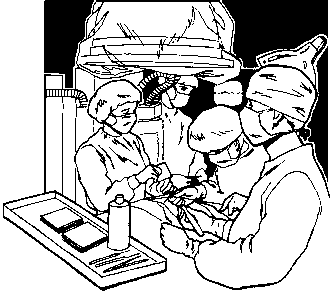
Contrary to the typical view of animal
rescuers who want their adopted pets "fixed", I personally
do not recommend routine neutering/spaying of cavies. I prefer
sows and boars be diligently kept separate. Companionship can
be provided by same sex pairing or even a neighboring cavy in
a nearby cage. Any surgery is risky. There is always the chance
a cavy has some underlying health condition that may be worsened
by the stress of surgery. Infections can occur. Sutures are occasionally
ripped or chewed out. Sometimes a cavy will react badly to the
anesthesia - or will suffer abnormal stress from the surgery.
All these things can occur with any surgery, but it is an acceptable
risk IF the surgery is needed to save a cavy's life or correct
a medical problem. Neutering is a voluntary, elective surgery.
|
 |
Cavy neuters are more complicated than
dog and cat neuters. The scrotum and testicles on dogs and cats
are relatively prominent and normally outside of the body. Inguinal
(groin) rings of the cavy are open and testicles can be retracted
into the abdomen. Neutering must be done by a cavy experienced
vet to reduce risking prolapse of abdominal contents after surgery.
Cavies cannot be medically treated like little dogs and cats.
Unfortunately, not everyone has access to a qualified "exotics"
veterinarian who treats cavies. Also, dogs and cats have much
longer legs and don't linger where they've urinated/defecated.
Cavies have short little legs and live in their soiled bedding
- so the incision site is exposed to more bacteria. Spaying a
sow is even more invasive, involved and risky. An incision is
made through the abdomen and major organs (uterus and ovaries)
are removed.
 |
In most cases a cavy will do fine if surgery
is done by a qualified experienced exotics veterinarian and if
proper aftercare is given. However, occasionally a cavy will
die during or after surgery - or will have difficulty recovering
from surgery and require extra care. This is something anybody
considering neutering should be aware of.
|
I have had only 2 boars neutered. One
did just fine, the other died 10 days after surgery. A gross
autopsy was done, the neuter site looked fine/incision looked
fine. The boar may have had some undetected health problem that
worsened from the stress of surgery. Both boars seemed very strong
and healthy before surgery - both boars were done by a vet experienced
with exotics. Both boars received proper aftercare. A friend
had her adult boar neutered by another vet that specializes in
exotics, her boar died 3 days after surgery. Yet another friend
had a boar neutered at the same clinic by an experienced vet.
She ended up syringe feeding her boar for months when he had
a very difficult time recovering. She did manage to pull him
through, but it took a year to regain the weight he lost after
surgery.
There is no guarantee that neutered boars
will then get along with each other or any other cavy. Neutered
boars are sometimes still very humpy and macho. This is more
likely in boars neutered after sexual maturity. The boar that
quit eating after neutering still lives alone - even though my
friend has tried him with several sows. The boar makes such a
pest of himself chasing and humping that the sows get irritated
and snappy with him.
We currently have about 68 cavies at the
shelter. Except for a handful of prima donna's all are kept in
same sex pairs or trios. Sows with sows/boars with boars. None
of my boars now are neutered. I find it all depends on the individual
animals hitting it off or not. Often 2 very young cavies of the
same sex will get along just fine - or an adult will usually
accept and be fondly tolerant of a baby. As for boars or sows
being more responsive to humans - I don't see a big difference
between the sexes. Both can be very sweet, loving, cuddly - or
independent and busy. The boars may be more flirty with their
humans, swaying their butts and purring loudly when held (same
behavior used to court the sows). If you're just starting out
with cavies it might be easiest to purchase or adopt 2 littermates
of the same sex at the same time - or a mother/daughter or father/son
who have been together. That way you don't have to worry about
quarantining cavies from different sources separately to avoid
spreading disease/bugs to each other. Please do consider adopting
from a cavy rescue or animal shelter. It is often possible to
get an already bonded pair of same sex cavies this route.
Occasionally seemingly bonded cavies will
suddenly, for no apparent reason, stop being buddies. Perhaps
somebody has stepped over a line or a youngster has become too
cocky for its own good. I have had this happen to both boar and
sow pairs, but more so the boys. If the fighting does not stop
after a couple days or gets more serious, the cavies may have
to be separated. I don't feel it's worth having cavies chew each
other up trying to establish a pecking order. I once tried the
squirt bottle routine with a couple of boars that suddenly weren't
getting along after living together for months. They did indeed
stop fighting while I was there to squirt them. One day when
I wasn't there to stop the fighting the younger boar ripped a
cheek open on the older boar. It could have used a couple stitches,
but since it was a Saturday night and we have no nearby emergency
cavy clinic - I "glued" the cheek shut with a thick
antibiotic ointment. It did heal just fine. I also admitted defeat
and separated the boars.
Keeping incompatible cavies in separate
but neighboring cages is another option. They still have company
- yet also have their own space. Same sex cavies may even learn
to socialize while enjoying exercise time in a large open area,
then retiring to their separate abodes afterwards. DO NOT
try this with a boar and sow though, she could be bred in the
wink (or two) of an eye.
The final decision is up to each owner.
When done by a qualified cavy veterinarian with proper after
care provided by the owner, the majority of cavy neuters are
successful. Some owners and rescuers have had dozens of boars
neutered with no trouble. I've also heard from many grieving
owners that have indeed lost their cavy after neutering. No surgery
is risk free, not even a cavy neuter. When YOUR much loved little
boar is one of the few that dies from being neutered - statistics
aren't much comfort.
I do not want to scare owners away from
having necessary surgery done on their cavies. Surgery is sometimes
the best or only way to save a cavy's life or correct a medical
problem. The key is to find a vet interested in cavies, knowledgeable
about cavies and experienced with cavies. I have had literally
countless cavy surgeries done over the years. All but a handful
have survived and recovered - to live better lives because of
the surgery. Some of the animals that did die had such serious
medical problems that we knew going in they might not survive
the surgery, but the only alternative was euthanasia. In cases
where a cavy requires surgery to live or thrive, it's worth the
risk.
This article and the JPGPR.com
logo are © 1993-2003 Vicki Palmer Nielsen - Jack Pine Guinea
Pig Rescue. No copyright is asserted herein regarding the illustrations
accompanying the article; copyrights, if any, of the illustrations
are retained by the original holders. If you would like to reproduce
anything from the website, please first e-mail Vicki for permission at
:

|




